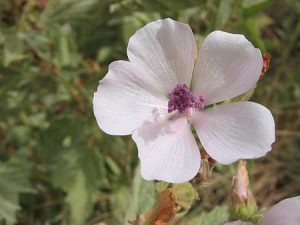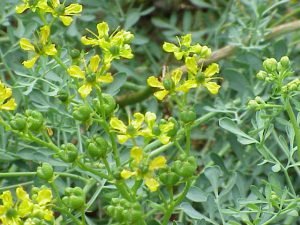Humeros homo habet maiores respectu
corporis aliis animalibus ad portandum
et sustinendum onus. Humeri creati sunt
ex ossibus fortibus, constituti et ad
sustinendam lesionem, carne in ea parte
fortiori. Hiis insunt scapule ossa lata
tenuia, que et debite latitudini
humerorum satisfacerent, carnem
fulcientes in ambitu, et tenuitate
moderata elegentiam pectoris
non fedarent.
Humeros si dolueris ex onere vel ex
labore equitandi aut quacumque ex
causa, gallinatio adipe ad ignem perunge.
Sequenti nocte, si non cessaverit dolor
vino calido in dicto adipe resoluto
humeros fove. Item dyaltea ad hoc valet.
Si dolor non cessat, sanguinem sub
scapulis extrahe cum flebotomo. Item
rutam in aceto coctam superpone. Item
lanam intinctam vino bullienti
- Translation
- Vocabulary
- Notes
About shoulders: A man has larger shoulders, with respect for the body, than other animals to carry and support a load. Shoulders were created from strong bones, arranged to sustain an injury, by stronger flesh in this part. The thin, broad bones of the shoulder blade belong to these, so that they can satisfy the width of the shoulders, supporting the flesh in a rotation, and also to not join the elegance of the chest with moderate thinness.
If you are hurting at the shoulders from a burden or from the work of riding horseback or from whatever cause, apply chicken fat to the inflammation. On the following night, if the pain has not ceased, keep the shoulders warm with warm wine dissolved in said fat. Likewise, dialthea is effective for this. If the pain does not cease, extract blood under the shoulder blades with a scalpel. Likewise, place rue cooked in vinegar (on it). Likewise wool saturated in bubbling(/boiling) wine.
humerus, humeri m II: shoulder
respectus, respectus m IV : regard, consideration, respect (for) (+ gen.)
sustineo, sustinere, sustinui II: support, sustain, restrain, control
onus, oneris n II: burden, load
ossum, ossi n II: bone, kernel, stone
constituti: noun constitutum, constituti, n II (genitive, singular) arrangement, agreement
laesiō, laesiōnis, f III: harm, injury
caro, carnis f III: flesh, meat, pulp of a fruit, body
insum, inesse, infui IRR: I belong to, I am, in, going on, involved in or with
scapulae, scapularum f pl I: shoulder blades
tenuis, tenuis, tenue III: thin, fine, slender, weak, watery, slight, trifling, delicate, subtle
debeo, debere, debui, debitus II: owe
latitudo, latitudinis f. III: width, breadth, extent; latitude
satisfacio, satisfacere, satisfeci, satisfactum (+DAT) III: satisfy, content, secure, pay off, apologize, make amends
fulcio, fulcire, fulsi, fultum IV: prop up, support
ambitus, ambitus m IV: circuit, orbit, revolution, cycle, periphrastic, circumlocution, show, ostentation, vanity, bribery, environment
tenuitas, tenuitatis f III: thinness
moderatus, moderata, moderatum I/II: mitigated, managed, controlled, moderated
elegantia, elegantiae f I: elegance, taste, propriety, grace
pectus, pectoris n III: chest, breast, (figuratively)soul, heart, spirit, mind, understanding, person, individual
faedarent: to join
doleo, dolere, dolui II: to grieve for; feel or suffer pain
equito, equitare, equitavi, equitatum I: ride horseback
quacumque adv: wherever
causa, causae f I: cause, reason; occasion; pretence (with gen.= because of)
gallinatius, gallinatia, gallinatium I/II: of a chicken
adeps, adipis m/f III: fat, lard, grease
perungo, perungere, perunxi, perunctum III: thoroughly anoint/rub/smear with oil, grease, etc.
cesso, cessare, cassavi, cessatum I: be remiss/inactive; hold back; leave off; delay; stop, cease
vinum, vini n II: wine
calidus, calida, calidum I/II: warm, hot; fiery
resolvo, resolvere, resolvi, resolutum III: release, disperse, melt, dissolve
foveo, fovere, fovi, fotus II: keep warm; foster, maintain
Item adv: likewise, similarly; besides, also
dyalt(h)ea, dyalt(h)eae f I: althea officinalis, a plant also known as marsh mallow
valeo, valere, valui II: be healthy, be strong
extraho, extrahere, extraxi, extractum III: draw out, extract
flebotomum, flebotomi n: a surgical tool with which a vein is cut
ruta, rutae f I: rue (a plant with medicinal properties)
acetum, aceti n II: vinegar
coquo, coquere, coxi, coctus III: cook; boil, fry; stir up
superpono, superponere, superposui, superpositum III: place over or on top of
lana, lanae f I: wool, fleece; soft hair; down
inting(u)o, inting(u)ere, intinxi, intinctum III: dip/plunge in; saturate, steep; cause to soak in
bullio, bullire, bullivi, bullitus IV: bubble, boil; make bubbles
lesionem laesionem
fortiori ablative of cause
Hiis later spelling of his, dative plural of demonstrative pronoun hic, haec, hoc (this, these). Antecedent is humeri.
scapule scapulae
que quae, feminine nominative plural form of relative pronoun qui, quae, quod. Antecedent is scapulae. This best understood as a relative clause of purpose.
debite debitae, takes the dative
lesio laesio
fedare faedare
et tenuitate… non fedarent the idea is an aesthetic one, i.e. it would look strange if the shoulder blades were too thin, and this would not fit well with the “elegance of the chest”. Thus, humans have wide shoulders.
Dyaltea Dialthea
Althaea officinalis, or marsh-mallow: a perennial species used in herbalism. A confection has been made from the root since ancient Egyptian times. The generic name, Althaea, is derived from the Greek ἄλθειν (to cure), from its supposed healing properties.
dyaltea ad hoc valet literally, “dialthea is strong toward this”
flebotomum a surgical tool with which a vein is cut, similar to a scalpel
rutam rue plant
Rue can be applied as a compress to painful areas, and can alleviate swelling in sore muscles. It contains high levels of rutin and coumarin, and other chemical compounds that make it great for relieving nerve and muscle pain, as well as reducing inflammation.


